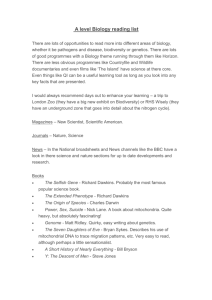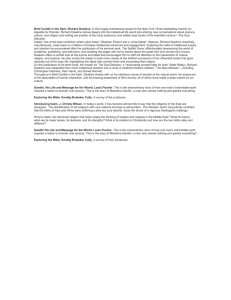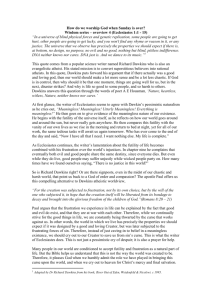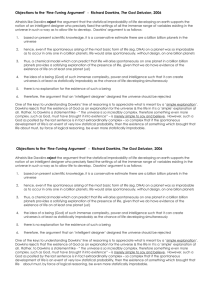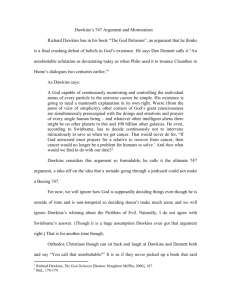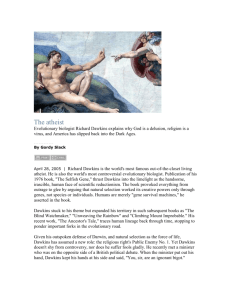Wikipedia Article -
advertisement
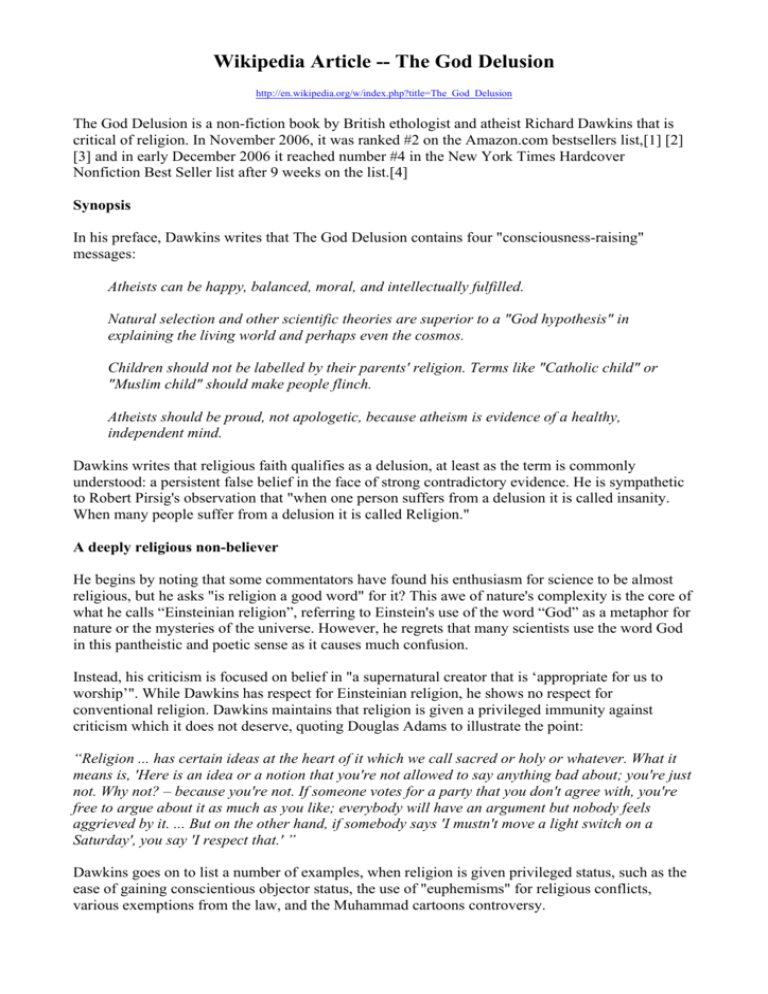
Wikipedia Article -- The God Delusion http://en.wikipedia.org/w/index.php?title=The_God_Delusion The God Delusion is a non-fiction book by British ethologist and atheist Richard Dawkins that is critical of religion. In November 2006, it was ranked #2 on the Amazon.com bestsellers list,[1] [2] [3] and in early December 2006 it reached number #4 in the New York Times Hardcover Nonfiction Best Seller list after 9 weeks on the list.[4] Synopsis In his preface, Dawkins writes that The God Delusion contains four "consciousness-raising" messages: Atheists can be happy, balanced, moral, and intellectually fulfilled. Natural selection and other scientific theories are superior to a "God hypothesis" in explaining the living world and perhaps even the cosmos. Children should not be labelled by their parents' religion. Terms like "Catholic child" or "Muslim child" should make people flinch. Atheists should be proud, not apologetic, because atheism is evidence of a healthy, independent mind. Dawkins writes that religious faith qualifies as a delusion, at least as the term is commonly understood: a persistent false belief in the face of strong contradictory evidence. He is sympathetic to Robert Pirsig's observation that "when one person suffers from a delusion it is called insanity. When many people suffer from a delusion it is called Religion." A deeply religious non-believer He begins by noting that some commentators have found his enthusiasm for science to be almost religious, but he asks "is religion a good word" for it? This awe of nature's complexity is the core of what he calls “Einsteinian religion”, referring to Einstein's use of the word “God” as a metaphor for nature or the mysteries of the universe. However, he regrets that many scientists use the word God in this pantheistic and poetic sense as it causes much confusion. Instead, his criticism is focused on belief in "a supernatural creator that is ‘appropriate for us to worship’". While Dawkins has respect for Einsteinian religion, he shows no respect for conventional religion. Dawkins maintains that religion is given a privileged immunity against criticism which it does not deserve, quoting Douglas Adams to illustrate the point: “Religion ... has certain ideas at the heart of it which we call sacred or holy or whatever. What it means is, 'Here is an idea or a notion that you're not allowed to say anything bad about; you're just not. Why not? – because you're not. If someone votes for a party that you don't agree with, you're free to argue about it as much as you like; everybody will have an argument but nobody feels aggrieved by it. ... But on the other hand, if somebody says 'I mustn't move a light switch on a Saturday', you say 'I respect that.' ” Dawkins goes on to list a number of examples, when religion is given privileged status, such as the ease of gaining conscientious objector status, the use of "euphemisms" for religious conflicts, various exemptions from the law, and the Muhammad cartoons controversy. The God hypothesis Dawkins begins Chapter 2 by describing Yahweh, the God of the Old Testament, as "the most unpleasant character in all fiction" and lists 19 serious character faults and continues by arguing that the God Hypothesis ("there exists a super-human, supernatural intelligence who deliberately designed and created the universe and everything in it, including us") is a scientific hypothesis about the universe, one that should be treated with as much scepticism as any other hypothesis. For this reason, Dawkins argues, Stephen Jay Gould’s concept of non-overlapping magisteria cannot be used to defend theologians from criticism. Impartial agnosticism would imply that nothing can be said about the probability of God’s existence, a position that Dawkins suggests is incorrect. Dawkins further argues, following Bertrand Russell, that although "you cannot disprove the existence of God" it is also impossible to disprove the existence of an orbiting teapot - and also cites unicorns, the Flying Spaghetti Monster and tooth fairies. Hence the inability to disprove the existence of God provides no positive reason to believe. Rather, Dawkins argues that the burden of proof is on the advocates of the existence of God. Arguments for God's existence In Chapter 3, Dawkins turns his attention to the main philosophical arguments in favour of God’s existence. He discusses the proofs of Thomas Aquinas, arguing that "it is by no means clear that God provides a natural terminator to the regresses", and suggesting that the Argument from Degree is "fatuous". He reserves the argument from design (which he identifies with the Teleological Argument), for later discussion. He reduces Anselm's Ontological Argument to "the language of the playground". He dismisses the Argument from beauty as "not spelled out by its proponents". On the Argument from Personal Experience he points out that some of these are illusions, and all may be. On the Argument from Scripture he suggests that "the gospels are ancient fiction". On the Argument from Admired Religious Scientists he points out that they are a minority. Regarding "Pascal's Wager", he suggests that "Pascal was probably joking when he promoted his wager", and that the Bayesian Arguments promoted by people such as Stephen Unwin are cases of "Garbage In Garbage Out" Why there almost certainly is no God He states in Chapter 4 that evolution by natural selection can be used to demonstrate that the argument from design is wrong. He argues that a hypothetical cosmic designer would require an even greater explanation than the phenomena that they intended to explain, and that any theory that explains the existence of the universe must be a “crane”, something equivalent to natural selection, rather than a “skyhook” that merely postpones the problem. He uses the argument from improbability, for which he introduced the term "Ultimate Boeing 747 gambit", to argue that "God almost certainly does not exist": "However statistically improbable the entity you seek to explain by invoking a designer, the designer himself has got to be at least as improbable. God is the Ultimate Boeing 747." The "Boeing 747" reference alludes to a statement reportedly made by Fred Hoyle: the "probability of life originating on earth is no greater than the chance that a hurricane sweeping through a scrapyard would have the luck to assemble a Boeing 747". Dawkins objects to this argument on the grounds that it is made "by somebody who doesn't understand the first thing about natural selection". A common theme in Dawkins' books is that natural selection, not chance, is responsible for the evolution of life, and that the apparent improbability of life's complexity does not imply evidence of design or a designer. Here, he furthers this argument by presenting examples of apparent design. Dawkins concludes the chapter by arguing that his "Ultimate 747" gambit is a very serious argument against the existence of God, and that he has yet to hear "a theologian give a convincing answer despite numerous opportunities and invitations to do so". Dawkins reports that Dan Dennett calls it "an unrebuttable refutation" dating back two centuries. The roots of religion Chapter 5 explores the roots of religion and why religion is so ubiquitous across all human cultures. Dawkins advocates the "theory of religion as an accidental by-product – a misfiring of something useful" and asks whether the theory of memes, and human susceptibility to religious memes in particular, might work to explain how religion might spread like a "mind" virus across societies. The roots of morality: why are we good? In chapter 6, Dawkins turns his attention to the subject of morality, arguing that we do not need religion in order to be good. Instead, he maintains that our morality has a Darwinian explanation: altruistic genes have been selected through the process of our evolution, and we possess a natural empathy. The 'Good' Book and the changing moral "zeitgeist" The following chapter continues the theme of morality, arguing that there is a moral Zeitgeist that continually evolves in society, often in opposition to religious morality, which Dawkins feels is often warped and brutish. He uses examples of religious morality from the Bible to illustrate what he sees as the barbarism of much religious morality. What's wrong with religion? Why be so hostile? Dawkins turns to the question of why he feels so hostile towards religion in Chapter 8, arguing with examples that religion subverts science, fosters fanaticism, encourages bigotry towards homosexuals, and influences society in other negative ways. Southern preachers used the Bible to justify slavery by claiming Africans were descendants of Abraham's sinful son. During the Crusades, "pagans" and "heretics" who would not convert to Christianity were murdered. Childhood, abuse and the escape from religion One of these ways is the indoctrination of children, a subject to which Dawkins devotes chapter 9. He equates the religious indoctrination of children by parents and teachers in faith schools to a form of mental abuse. Dawkins wants people to cringe every time somebody speaks of a “Muslim child” or a “Catholic child”, wondering how a young child can be considered developed enough to have such independent views on the cosmos and humanity’s place within it. By contrast, Dawkins points out, no reasonable person would speak of a "Marxist child" or a "Tory child". A much needed gap? The final chapter asks whether religion, despite its alleged problems, fills a “much needed gap”, giving consolation and inspiration to people who need it. According to Dawkins, these needs are much better filled by non-religious means such as philosophy and science. He argues that an atheistic worldview is life-affirming in a way that religion, with its unsatisfying “answers” to life’s mysteries, could never be. Reviews in magazines The physicist Lawrence M. Krauss, writing in Nature, says that although a "fan" of Dawkins, "I wish that Dawkins ... had continued to play to his strengths". Krauss suggests that an unrelenting attack upon people's beliefs might be less productive than "positively demonstrating how the wonders of nature can suggest a world without God that is nevertheless both complete and wonderful." Krauss remarks, "Perhaps there can be no higher praise than to say that I am certain I will remember and borrow many examples from this book in my own future discussions." The Economist praised the book, focusing on Dawkins' critiques of the influence of religion upon politics and the use of religion to insulate political positions from criticism. "The problem, as Mr. Dawkins sees it, is that religious moderates make the world safe for fundamentalists, by promoting faith as a virtue and by enforcing an overly pious respect for religion." Marxist literary critic Terry Eagleton in the London Review of Books argues that Dawkins has insufficient understanding of the religious concepts he is attacking to engage with them effectively. He questions whether Dawkins has read or heard of Christian thinkers like Eriugena, Rahner or Moltmann. He denies that all faith is blind faith, suggests that "while faith, rather like love, must involve factual knowledge, it is not reducable to it". He upholds that "Critics of the most enduring form of popular culture in human history have a moral obligation to confront that case at its most persuasive". Andrew Brown in Prospect considers that "In his broad thesis, Dawkins is right. Religions are potentially dangerous, and in their popular forms profoundly irrational". He criticises, however, the assertion that "atheists ... don't do evil things in the name of atheism" and notes that "under Stalin almost the entire Orthodox priesthood were exterminated simply for being priests." Furthermore, he cites Robert Pape that religious zealotry is neither necessary nor sufficient for suicide bombers, and concludes that the book is "one long argument from professorial incredulity." Harper's Nov. 2006 front paged highlighted: "In Defense of Religion: Marilynne Robinson on Richard Dawkins's Hysterical Scientism." Pulitzer prize winner Marilynne Robinson provides a theistic critique of Dawkins. Robinson portrays Dawkins as having superficial knowledge of the Bible and as intolerant of theists, yet demanding tolerance of science: "if religion is to be blamed for the fraud done in its name, then what of science? Is it to be blamed for the Piltdown hoax, for the long-credited deceptions having to do with cloning in South Korea? If by "science" is meant authentic science, then "religion" must mean authentic religion, granting the difficulties in arriving at these definitions." In An Exercise in Contempt, the American Spectator 2006, Richard Kirk contrasts Alfred North Whitehead’s willingness to look at the big picture and give historical players their due credit with “the scattershot pettiness that pervades Richard Dawkins’ book. “Far from being a serious philosophical book, this ill-edited and garrulous diatribe contains just about anything that crosses the author's mind" with “page after sarcastic page of attacks against any foe Dawkins considers an easy target.” Dawkins avoids the “real question" of "whether one's explanation terminates with a meaningless cosmos or with a being who provides a reason for things.” David Baltimore in American Scientist praises the book as "A Defense of Atheism ... quite extensive and erudite ... full of pithy statements that skewer religion by substituting a rational approach to questions" while noting that "Dawkins doesn't ever come to terms with the large number of scientists who are comfortable believing both [in] evolution ... and that there is a God." He suggests that Dawkins's "core reason for writing: [is] that 'The status of atheists in America today is on a par with that of homosexuals fifty years ago,' and he wants to help change that status to tolerance, if not acceptance." "Dawkins does talk about the possibility that religion fills a deepseated need in people, and he tries to dismiss it. But the evidence that this is the case is so strong, and the train of belief stretches so far back into human history, that the theory deserves more respect." Reviews in national newspapers Joan Bakewell reviewed the book for The Guardian, stating "Dawkins comes roaring forth in the full vigour of his powerful arguments, laying into fallacies and false doctrines", noting it is a timely book: "These are now political matters. Around the world communities are increasingly defined as Muslim, Christian, Jewish, and living peaceably together is ever harder to sustain....Dawkins is right to be not only angry but alarmed. Religions have the secular world running scared. This book is a clarion call to cower no longer." Marek Kohn in The Independent suggests that in this book "passions are running high, arguments are compressed and rhetoric inflated. The allusion to Chamberlain, implicitly comparing religion to the Nazi regime, is par for the course." He also argues that "another, perhaps simpler, explanation for the universality and antiquity of religion is that it has conferred evolutionary benefits on its practitioners that outweigh the costs. Without more discussion, it isn't clear that Dawkins's account should be preferred to the hypothesis that religion may have been adaptive in the same way that making stone tools was." John Cornwell states in The Sunday Times "there is hardly a serious work of philosophy of religion cited in his extensive bibliography, save for Richard Swinburne – himself an oddity among orthodox theologians". He also complains that "Dawkins sees no point in discussing the critical borders where religion morphs from benign phenomenon into malefic basket case. This is a pity, since his entire thesis becomes a counsel of despair rather than a quest for solutions." Michael Skapinker in the Financial Times, while finding that "Dawkins' attack on the creationists is devastatingly effective", considers him "maddeningly inconsistent." He argues that, since Dawkins accepts that current theories about the universe (such as Quantum theory) may be "already knocking at the door of the unfathomable" and that the universe may be "not only queerer than we suppose, but queerer than we can suppose", "the thought of how limited our comprehension is should introduce a certain diffidence into our attempted refutations of those who think they have the answer". Mary Wakefield, writing in the Daily Telegraph, considers that Dawkins's failure to understand why intelligent people believe in God means that she would "eat my Sunday hat if this book persuades even the most hesitant half-believer to renounce religion". Also in the Telegraph, Kenan Malik is of a similar view saying that "if you want an understanding of evolution or an argument for atheism, there are few better guides than Richard Dawkins" but "so great is his loathing for religion that it sometimes overwhelms his reasoned argument" Reviews by other commentators Alister McGrath, a biochemist and Christian theologian, describes The God Delusion as "his weakest book to date, marred by its excessive reliance on bold assertion and rhetorical flourish, where the issues so clearly demand careful reflection and painstaking analysis, based on the best evidence available". He suggests that "All ideals — divine, transcendent, human, or invented — are capable of being abused. That’s just the way human nature is. And knowing this, we need to work out what to do about it, rather than lashing out uncritically at religion." Daniel Dennett, a friend and "ally" of Dawkins's, wrote a review for Free Inquiry, where he states that they agree about most matters, except one central issue: "Dawkins is quite sure that the world would be a better place if religion were hastened to extinction and I am still agnostic about that." In Dennett's view many "avowedly religious people" are actually atheist, but find religious metaphors and rituals useful. However, he applauds Dawkins's effort to "raise consciousness in people who are trapped in a religion and can’t even imagine life without it." In conclusion, he regrets that neither he himself nor Dawkins have the patience to deal with theist arguments properly, noting that "Serious argument depends on mutual respect, and this is often hard to engender when disagreements turn vehement." Peter S Williams, a Christian philosopher and author, in a review for the Christian charity Damaris International, says that while "The God Delusion is the work of a passionate and rhetorically savvy writer capable of making good points against religious fundamentalism," Dawkins "is out of his philosophical depth". Williams proposes rebuttals to several of the book's arguments against the existence of God, including Dawkins' case against the anthropic principle, his "argument from improbability" and Dawkins' own God hypothesis.
